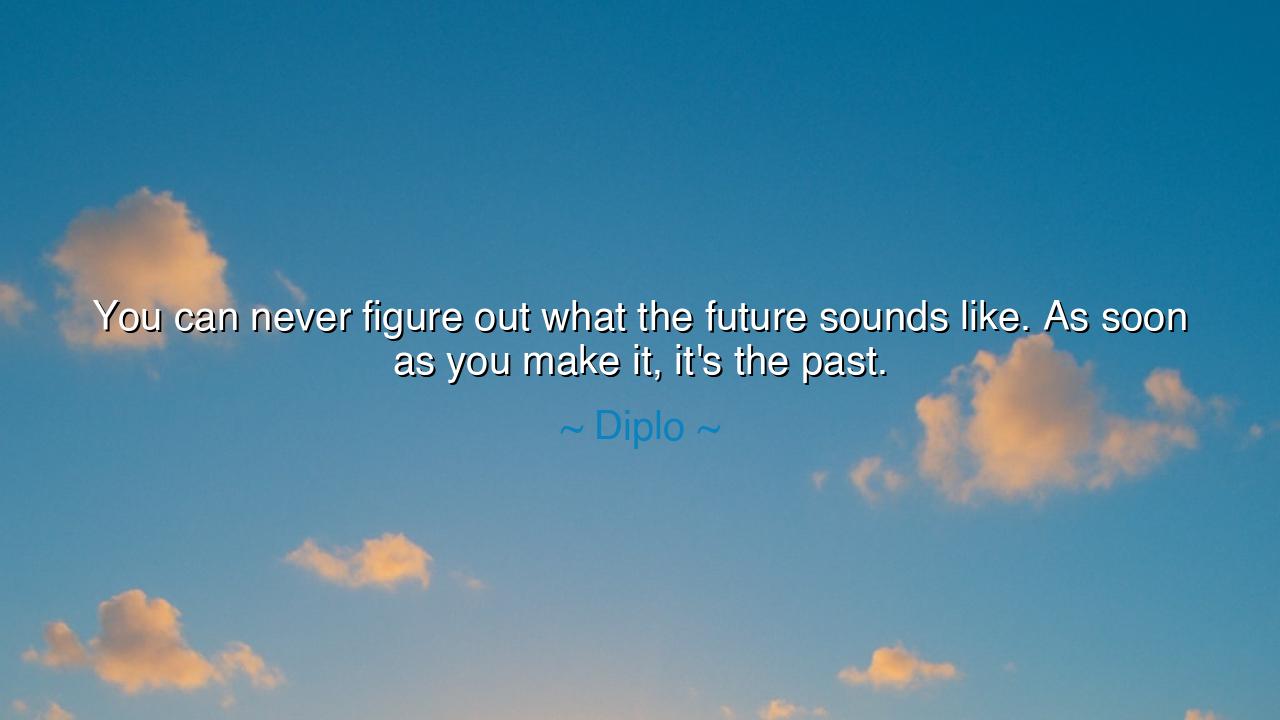
You can never figure out what the future sounds like. As soon as
You can never figure out what the future sounds like. As soon as you make it, it's the past.






In the ever-unfolding tapestry of time, there is a truth that resonates through every age—the future is always just beyond our grasp. The words of Diplo, "You can never figure out what the future sounds like. As soon as you make it, it's the past," speak to the elusive nature of time and the impermanence of human creativity. He reminds us that the present moment, no matter how revolutionary or groundbreaking it seems, is constantly slipping away, leaving behind only the echoes of what once was. The future, forever ahead of us, can never be fully captured, for as soon as we try to define it, it becomes the past, slipping into history.
The ancient philosophers understood this truth in different ways. Heraclitus, the Greek philosopher, famously declared, "You cannot step into the same river twice." His words were an acknowledgment that everything in life is in a constant state of flux—there is no static moment, no unchanging future. Just as Heraclitus believed that the river was always moving, so too is the future always slipping beyond our grasp. We cannot hold onto it, nor can we predict it, for as soon as we attempt to do so, it changes and becomes the past. Diplo’s reflection on the future echoes this ancient wisdom, pointing out the fleeting nature of both time and creative expression.
Consider the story of Beethoven, whose music redefined the sound of his time. He composed his symphonies with a vision of the future in mind, seeking to break away from the conventions of the past. Yet, when his work was finally heard by the public, it was already transformed—what was once a revolutionary sound quickly became the past, even as it shaped the future of music. Every time Beethoven completed a piece, it was already overtaken by the next moment, the next note, the next invention in music. His work, like the music of any era, existed in a space between the future and the past, constantly moving forward even as it was remembered and celebrated by those who came after. Diplo, too, recognizes this paradox—the future is always just beyond our reach, even as it shapes the present.
In the world of art, this constant motion between past, present, and future is a central theme. Picasso, one of the most innovative artists of the 20th century, continually pushed boundaries, creating pieces that were ahead of their time. Yet, by the time his works were embraced as masterpieces, they had already become part of the past, eclipsed by the next wave of creativity. Just as Diplo observes, Picasso's art, once groundbreaking, was quickly integrated into the fabric of history. This cycle is true for all creators. What we once called futuristic is soon historic, and the present moment is forever slipping into the past.
The lesson embedded in Diplo's words is one of humility and acceptance. As we create, whether in the realm of art, music, or any field, we must understand that the future we imagine is fleeting. The very act of creating defines the future in its moment, but that future is constantly transforming, becoming part of the past. The very nature of creativity is that it transcends time, moving through the present and influencing what is yet to come, even as it becomes a part of what has already passed. Thus, we are called not to cling to our creations as fixed moments in time, but to embrace them as part of a greater flow of creation and transformation.
In practical terms, this means that we must embrace the constant evolution of our work and ideas. Just as Diplo captures the transitory nature of the future in his art, we must recognize that our creative expressions will never remain the same—they will evolve, they will be redefined, and they will eventually become part of the past. Yet, this is not a reason for despair, but a reason to celebrate the cycle of creation and transformation. Each new idea we have, each new piece of music or art we create, contributes to the ongoing movement of time, even as it becomes part of the history we leave behind.
In the end, Diplo's words are a reminder to live in the moment and to recognize the impermanence of all things. We cannot hold onto the future, nor should we cling too tightly to the past. The true beauty of creativity lies in the recognition that it exists in a constant state of flux, forever shaping the future even as it becomes part of history. By accepting this, we are freed from the burden of perfection, allowing ourselves to create with freedom, knowing that each piece of our work is a fleeting moment that will, in its own time, shape the world and then fade into memory. Creativity is not about preserving the future; it is about embracing the flow of time and using it to leave a mark on the world, however temporary it may be.






AAdministratorAdministrator
Welcome, honored guests. Please leave a comment, we will respond soon